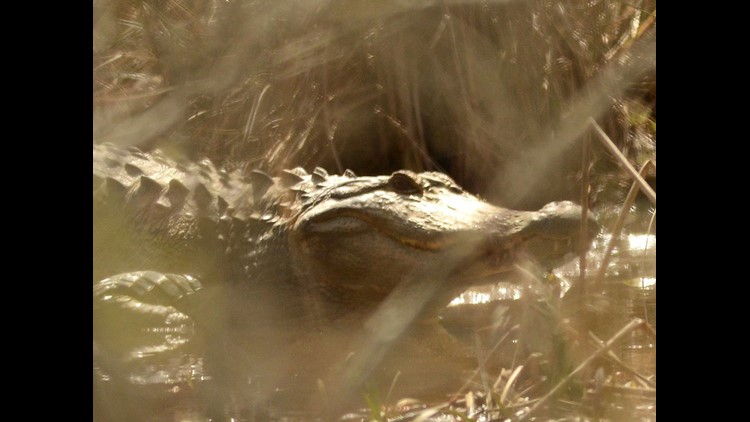ATLANTA (WXIA) -- There has been an on-going search in and around the Chattahoochee River for a big, elusive aquatic reptile for more than a decade.
Now, for the first time in two or three years, there are huge (and scaly) leads in the case. The Chattahoochee alligator, first spotted in the area in 2005, has re-emerged -- and there's video proof, most recently from an 11Alive News camera on Thursday.
Images of the alligator were taken on Wednesday, March 9, by Cobb County nature photographer Victor Webb. The photos show the gator, estimated to be between 8-and-10-feet in length, on the banks of the river in the swampy area near Cochran Shoals Park, not far from Interstate 285 and Interstate North Parkway.
It's the same area where a gator was last photographed in 2013, and in 2009. The National Park Service has posted signs in the area advising park visitors to keep their animals leashed and to avoid the alligator if they see it. Just last month, 11Alive's Jerry Carnes was hiking in the park and tweeted out a warning sign about the alligator.
Park rangers said they are sure it's the same gator that people have spotted in this area from time to time since 2005. Definitely not native to this area, it has made itself a home here, possibly wintering inside the warmth of beaver lodges, growing long and fat on abundant wildlife in the area.
"Years ago, I heard this legend that he was in the Chattahoochee," said jogger Karen Armstrong.
Armstrong said she was delighted to finally see it's real.
Wildlife photographer Victor Webb gave her a look through his telephoto lens.
According to National Park Service officials, the alligator tends to remain out of the Chattahoochee River itself, as the waters there are generally colder than what that type of alligator normally prefers.
Officials also noted the alligator shies away from contact with people, so, for now, they will leave it alone and not worry about trapping and removing it.
However, Georgia's Department of Natural Resources wants, ultimately, to remove the gator.
"Our desire is to move the alligator to its natural habitat, south of Georgia's fall line, and away from dense, human population, said John Bowers, of DNR's Wildlife Resources Division, adding that the further south, the better it will be for the gator. "It seems to be doing well. But it is well outside of its range. We want to work with the National Park Service on this and come up with a plan to move it."
As it is, the gator remains content to nap and eat and stay away from humans, protected in the national park. And wherever it ends up, it has, potentially, a long life ahead of it -- alligators can live for up to a half-century.
RELATED | 700-pound gator caught in Florida



